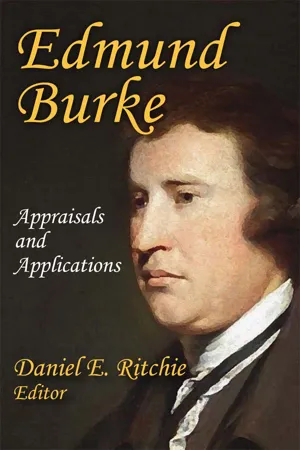
- 331 pages
- English
- ePUB (mobile friendly)
- Available on iOS & Android
About This Book
The eighteenth century remains contemporary more than 200 years later because the fundamental questions raised then about politics in both the American and French Revolutions still speak to us. The writings of Edmund Burke on these and other political events of his time are today acknowledged as the basis of modern conservative thought. This volume brings together an outstanding collection of interpretative essays on Burke, and serves as a basic introduction to this seminal thinker.
A member of the British Parliament from 1766 to 1794, Edmund Burke had sympathized with the American War of Independence and argued for reform of British policy toward Ireland and India, but he surprised many of his friends by his early, vehement opposition to the French Revolution. This volume brings together assessments of these and other statements by Burke by contemporaries such as Samuel Taylor Coleridge and William Hazlitt, along with essays by Irving Babbitt and Russell Kirk, who established his significance for twentieth-century conservatism.
This is a collection of the best, previously published interpretive essays on Burke. It will be of interest to all those interested in the philosophical roots of conservatism, in the history of political thought, in revolution, and in modern political ideologies.
Frequently asked questions
Information
Part One
Burke and the Literary Imagination
1
Coleridge’s Fragments on Burke
I. The Friend, No. 9. Oct. 12, 1809
5II. The Friend [1818]
III. Biographia Literaria [1817]
IV. Table Talk
Notes
2
Hazlitt’s Criticism of Burke
Character of Mr. Burke [1807]
Table of contents
- Cover
- Half Title
- Title Page
- Copyright Page
- Dedication
- Table of Contents
- Foreword
- Acknowledgements
- Introduction
- Important Dates in the Life of Edmund Burke
- Short Titles
- Part One. Burke and the Literary Imagination
- Part Two. Burke and Revolution
- Part Three. Burke and Constitutional, Party Government
- Part Four. Burke and the Radical Mind
- Part Five. Burke and the Conservative Mind
- Bibliography
- Index